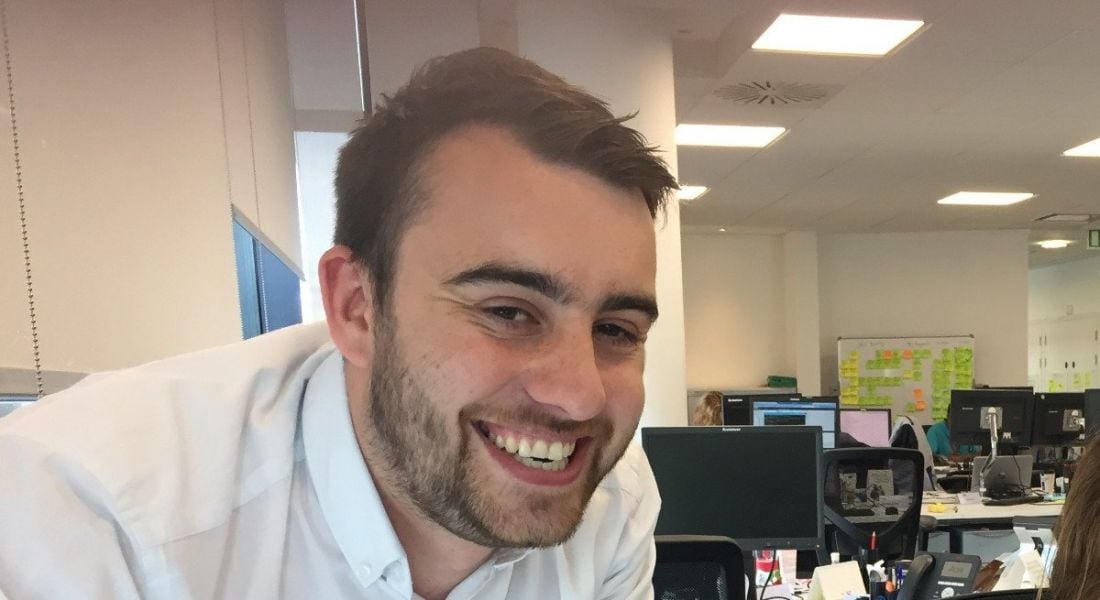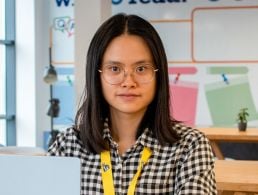For those coming out of third-level education, graduate programmes can be vital to get into the industry.
Graduate programmes are an essential part of filling and maintaining the talent pipeline across all industries.
How good a graduate programme is can have a serious impact on the future of work and on the talent level of the company staff, too.
We heard from Sean O’Callaghan, who went through the graduate programme at Aon’s Centre for Innovation and Analytics (ACIA).
What did you study in college?
I studied product design (marketing and innovation) and graduated from Maynooth University in 2015. It was an interesting course as we covered a variety of different topics, such as sketching, prototyping, 3D modelling, ethnography, digital design prototyping and design-thinking principles.
The reason I chose this course is simply because I am a very creative person and I enjoy solving problems. This course gave me a user-centred approach to product design, teaching me that research is essential in order to fully grasp the behaviours of the end user.
Without a doubt, the most enjoyable aspect of this course was generating new concepts and prototyping. This allowed me to think freely and far ‘outside of the box’, test my new ideas and get feedback on them. The most rewarding part was putting your final design into someone’s hands and watching how they interact with the object or interface.
The course gave me a great platform to start my career as a UI/UX designer.
With this programme, are you now working in your desired industry?
Yes, I am very happy working in the innovation centre of a financial services industry. When I left college, I didn’t have a specific industry in mind where I wanted to work, I just knew that I wanted to work on innovative products that will help change an industry, and I think I’ve achieved that.
When working in insurance, there is plenty of room for innovation as ever-changing technologies help to drive a new customer experience. This is a very exciting challenge as a UI/UX designer as it allows me to be forward-thinking about the future customer’s experience.
What drew you to Aon when you were seeking work as a graduate?
For me, the key driver for working in ACIA is being involved in a wealth of different projects that help to change an industry.
Another aspect that grabbed my attention is size of the company – Aon is a massive global company and has offices all around the world.
It is one of the top insurance brokerages in the world, meaning I will gain experience working with some of the best in the industry. I am also a huge Manchester United fan, so that’s a great added bonus!
What expectations did you have before you began the programme?
I knew it was bound to be an interesting challenge as I was starting in a new job and a new industry. I was interested to learn about the projects that I would be involved in and the opportunities that would arise from it.
Looking back to when I applied for the programme, the part I underestimated the most before starting was the training and network opportunities.
The training I received was excellent and I got to work on a graduate project, which allowed me to grow my professional network with both colleagues and senior stakeholders.
What duties and responsibilities were you given initially?
Originally, I started in Aon as an intern and during this time, my tasks included creating low-fidelity prototypes, sitemaps and content management.
This was an entry-level position – however, I gained a mass of knowledge about the industry and the audience we are designing the products for. By the end of my term as an intern, my responsibilities had increased significantly and I had been offered a position in the graduate programme.
Did the scope of your work change as the programme progressed?
Yes, my scope of work changed as the programme progressed. I was given higher-profile projects, where all aspects of the design process would be needed.
I worked my way up to handling new projects for bigger clients. The increased responsibility lead to more involvement with senior management and afforded greater opportunities to work with a wide range of Aon colleagues globally on projects.
I moved from lower-fidelity prototyping software to higher-fidelity software, which allowed for more in-depth user testing.
Can you describe a typical day in your role?
We work in an agile environment, so every morning we have our daily project stand-ups, where we answer three questions: What did you do yesterday? What do you plan to do today? Any blockers? This is a great way to start the day because it allows you to clearly see what needs to be achieved for the day.
My role will change on a daily basis depending which phase of the design the project is at. In the early stages of a project, I work a lot on user research through storyboarding, journey mapping and interviews.
As the project matures, the team ideates to solve the problem we have unearthed in the research stage. When ideating, we use various different brainstorming techniques and then we generate concepts. Finally, we test these concepts through prototypes with our end users to get feedback.
I am often working on a couple of projects at a time. However, each project is working towards an overall goal.
How do your responsibilities compare to more experienced employees?
My responsibilities align with some of the more experienced colleagues’. I am involved in multiple projects where I collaborate with colleagues at various levels across ACIA.
By working with more experienced colleagues on a regular basis, I have excellent opportunities to learn and develop alongside them.
Do you feel more prepared for working life after completing this programme?
I feel like I am already integrated into working life. The graduate programme has helped me improve my writing, presentation and networking skills. I utilise these skills in my work on a daily basis as I present projects to key stakeholders and colleagues.
Through this programme, I have had excellent opportunities to interact with senior-level management in my chosen field and have gained international exposure due to Aon’s global standing.
Why should someone apply to the graduate programme at Aon?
The training I benefited from in the first week is definitely an advantage to anyone starting in a graduate programme.
The management team in ACIA have provided me with excellent mentoring, support and guidance on projects. I have benefited greatly from the networking opportunities and the real responsibility afforded to me.
I would recommend the graduate programme to anyone hoping to develop their career on a national and international level.




